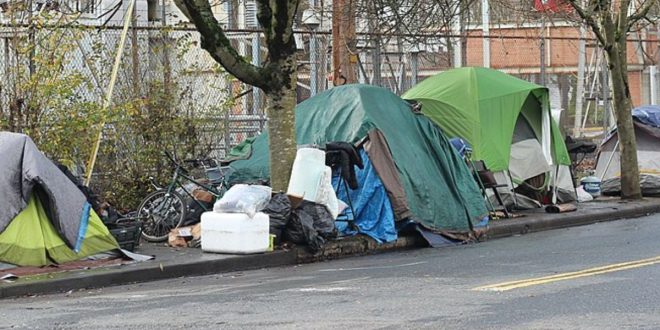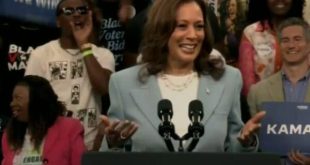
By Jarrett James Lash for The Political Insider
On June 28th, the United States Supreme Court ruled in Grants Pass v. Johnson that local laws that penalize homeless camping on public land do not violate constitutional protections against cruel and unusual punishment. This ruling has homeless individuals across the country caught in a double bind: face legal consequences for trying to survive, or uproot and relocate again and again.
As some local governments turn to law enforcement to manage individuals experiencing homelessness, faith-based institutions in those communities have a unique opportunity to provide an alternative. The Supreme Court’s ruling on homeless camping should be a rallying cry for religious communities to leverage their unparalleled capacity for philanthropy to thwart homelessness, rather than relying solely on government intervention.
Where Is The Church?
The provocative tweet goes around often: “If every church housed two homeless individuals, there would be no more homelessness.” According to the National Congregational Study Survey, an estimated 380,000 churches convened in the U.S. in 2020. As there are a recorded 653,104 homeless Americans, the statement technically holds. This raises critical questions about the role religious institutions can and should play in addressing the homelessness crisis.
Religious communities are already deeply involved in this work. According to the National Alliance to End Homelessness, faith-based organizations serve as “the backbone of the homeless shelter system in this country — operating, at a minimum, nearly 30 percent of emergency shelter beds for families and single adults at the national level.” However, not all emergency shelters are made equal.
Each year, during the last few weeks of January, volunteers from across the country participate in the Point-in-Time (PIT) Count, taking to the streets and visiting shelters to count individuals experiencing both unsheltered and sheltered homelessness. These statistics are drastically skewed from year-round conditions. Federal data reported that only 36.6% of unhoused individuals were unsheltered, but that only tells a portion of the story. Countless American communities solely operate shelters during the winter months to provide a necessary reprieve from the cold.
The National Alliance to End Homelessness reported that in 2022, the country had less than 188,000 year-round shelter beds for individual adults. With 463,590 unhoused single adults identified during the 2023 Point-in-Time Count, over half could be at risk of legal penalty if they cannot seek shelter. As the risk of legal penalty for not having a home looms, religious communities can help break the system of shelter closures when the weather gets warm by operating it themselves or by providing housing alternatives.
How Local Government Will Respond to Grants
In the wake of the Supreme Court ruling, local governments will respond in two ways: On the one hand, they will consider how to decrease the “public nuisance” of homeless loitering and vagrancy through camping bans, while on the other, they will seek to increase their shelter capacity. While local governments are readily equipped to mobilize their police force against homeless encampments, they are slow to cobble the required funding and navigate public concerns to expand the capacity of available shelters and low-barrier housing.
Religious communities have both the moral responsibility and the legal leverage to cut through the red tape. Faith-based institutions have a duty to provide moral leadership by actively undertaking the establishment of homeless shelters and low-income housing as a tangible expression of their faiths’ teachings on compassion. When communities shriek, “Not in my backyard!”, pastors need to respond with the compassionate imperative to serve the homeless, rallying their congregations to volunteer and support these initiatives.
When government funding is hard to come by, robust tithing can bridge financial gaps and ensure that the shelters are not only built but sustainably maintained. This commitment to tithing upholds the dignity and welfare of the most vulnerable, providing stability amid political changes and ensuring that services remain strong regardless of fluctuations in public sector funding.
Keep The Faith
Apart from churches’ access to donations-based funding, religious institutions have greater leverage to work around zoning laws. California provides an excellent model for this. Despite its low number of churches per capita and high homelessness rates, the state is pioneering YIGBY, or Yes in God’s Backyard, by signing the Affordable Housing on Faith and Higher Education Lands Act into law in October 2023. The law aims to combat California’s housing crisis by permitting religious groups to construct affordable housing on their property, offering flexibility in zoning regulations. Other states are looking to replicate the approach with similar legislation. For Californians, it’s now up to faith-based institutions in the state to provide solutions to house the unsheltered homeless.
As the dust settles on the Supreme Court’s ruling and the effect on the enforcement of camping becomes clear, the call to action for America’s religious communities is clear and urgent. Congregations across the country need to open doors, build shelters and housing, and advocate for policies that uphold the dignity of every individual. If the government prohibits sleeping without a home, our compassion should compel us to provide roofs for our neighbors in need.
Jarrett James Lash, a Young Voices contributor, covers the impact of housing markets, land use, and policy on the communities we live in. His X/Twitter is @jarrett_lash
 Top Naija News – Nigeria News, Nigerian News & Top Stories Top Naija News – Nigerian Newspapers, Nigerian News. topnaijanews is a daily Nigerian newspaper covering Latest News, Breaking News, Entertainment, Sports, Lifestyle and Politics.
Top Naija News – Nigeria News, Nigerian News & Top Stories Top Naija News – Nigerian Newspapers, Nigerian News. topnaijanews is a daily Nigerian newspaper covering Latest News, Breaking News, Entertainment, Sports, Lifestyle and Politics.




